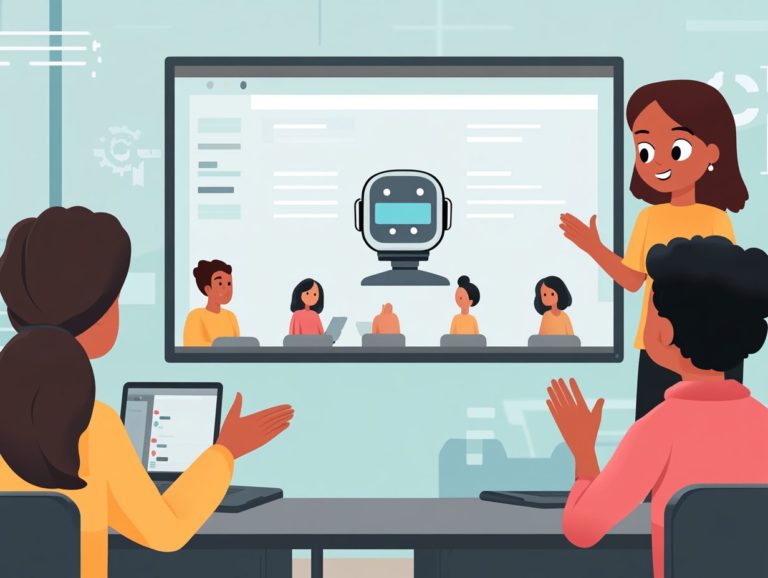using social media to enhance language skills
In today s digital age, social media has revolutionized language learning, presenting innovative avenues for practice and connection.
Platforms like Facebook, Instagram, and Twitter can be powerful allies in enhancing your language skills. This article explores both the benefits and limitations of using social media, offers guidance on selecting the right platforms, and shares strategies for engaging with native speakers.
Whether you re just starting out or seeking to refine your abilities, learn how to leverage social media today to elevate your language learning journey.
Contents
- Key Takeaways:
- The Role of Social Media in Language Learning
- How Social Media Can Improve Language Skills
- Choosing the Right Social Media Platforms
- Tips for Using Social Media to Enhance Language Skills
- Overcoming Challenges and Staying Motivated
- Frequently Asked Questions
- 1. What are the benefits of using social media to enhance language skills?
- 2. Can social media replace traditional language learning methods?
- 3. Are all social media platforms effective for enhancing language skills?
- 4. How can I improve my writing skills in a foreign language using social media?
- 5. What precautions should I take when using social media for language learning?
- 6. How can I maximize my language learning with social media?
Key Takeaways:

Social media offers many benefits for language learning, but it also has limitations that need to be considered.
Interactive language practice and access to authentic resources are two ways that social media can help improve language skills.
When choosing social media platforms for language learning, consider factors such as target language usage and availability of language learning resources.
The Role of Social Media in Language Learning
The role of social media in language learning has transformed remarkably, particularly with the emergence of digital communication platforms like Telegram.
These platforms support language acquisition and foster emotional regulation and academic resilience among students.
This, in turn, boosts their academic performance through engaging online classes and tailored educational programs.
Benefits and Limitations
The benefits and limitations of social media in language learning are multifaceted, presenting opportunities for heightened student engagement and challenges tied to foreign language anxiety.
While these platforms can cultivate resilience and a sense of emotional safety, they may also add to your mental effort, making anxiety management essential for a productive learning experience.
Interactive features on social media encourage greater participation, allowing you to immerse yourself in a variety of teaching methodologies that cater to different learning styles.
For instance, engaging in video discussions can significantly enhance your listening skills while providing visual context, making the learning process smoother.
However, the sheer volume of available information can inadvertently increase mental effort, potentially leaving you feeling overwhelmed.
This cognitive strain can amplify foreign language anxiety, making you hesitant to express yourself. Thus, understanding and managing these psychological impacts is vital in creating a balanced learning environment that supports your mental well-being while fostering effective language acquisition.
How Social Media Can Improve Language Skills
Social media can boost your language skills like never before! By engaging with various interactive platforms, you immerse yourself in active learning that promotes collaboration and offers immediate feedback. Explore using social media to enhance language skills for more effective strategies.
These digital tools leverage emotional experiences, creating a supportive environment that enhances your language proficiency and fuels your motivation to learn.
Interactive Language Practice
Interactive language practice through social networking sites presents valuable opportunities for peer interaction, crucial in enhancing your linguistic skills and promoting mobile-assisted language learning strategies.
This form of remote learning engages you effectively by leveraging principles from cognitive psychology.
For instance, language exchanges allow you to connect with native speakers eager to learn your language in return, fostering a mutually beneficial relationship that enriches both parties.
Chat groups on platforms like WhatsApp or Discord create a space for informal conversations, enabling you to practice real-time communication and engage in spontaneous discussions that mirror authentic language use.
These interactions break down language barriers and build your confidence, reinforcing the belief that social interaction is essential in the language acquisition process.
By participating in collaborative activities, you immerse yourself in cognitive engagement that is vital for developing fluency.
Access to Authentic Resources

Accessing authentic resources through social media platforms enriches your language education by immersing you in real-world contexts. This significantly boosts your English achievement and overall language proficiency.
This integration of tools and apps that help learn better enhances your learning experience and promotes effective acceptance of new tools. By interacting with native speakers on social media, you can practice your conversational skills in a relaxed environment and gain valuable insights into cultural nuances and colloquial expressions.
Engaging with videos and articles crafted by content creators from diverse backgrounds exposes you to various accents and idioms. This exposure sharpens your listening comprehension and deepens your appreciation for the language.
Leveraging technology in your language learning journey broadens the range of available resources, invigorating the educational process and making it more relevant and engaging for you as a modern learner.
Choosing the Right Social Media Platforms
Selecting the ideal social media platforms for language learning is essential to the instructional design process. This choice influences how effectively learners connect with educational programs and interactive platforms while addressing challenges such as communication apprehension and foreign language anxiety.
Making the right decision can elevate engagement strategies and ultimately enhance your language acquisition journey.
Factors to Consider
When selecting social media platforms for language learning, consider your motivations, emotional safety, and how well these platforms can be integrated into your planning. Evaluating these aspects ensures that your choices align with your educational goals and individual needs.
The user interface is crucial, greatly influencing how easily you can navigate and engage with the content. A comfortable browsing experience allows you to explore resources without frustration. Accessibility features enhance your ability to participate fully, accommodating different learning styles and providing tools for those with disabilities.
Community engagement fosters a sense of belonging, encouraging you to interact, share experiences, and support your peers throughout your learning journey. The availability of diverse resources from interactive activities to comprehensive materials enriches your learning experience, enabling you to make well-informed decisions in your instructional design.
Tips for Using Social Media to Enhance Language Skills
You can elevate your language skills by employing a strategic approach that prioritizes learner motivation and integrates engaging instructional design.
By following these refined tips, you can create a robust framework that not only provides constructive feedback but also enriches your language acquisition experience, guiding you on your journey to fluency.
Creating a Language Learning Plan
You can supercharge your language learning by creating a dynamic plan that uses social media. Thoughtful planning involves considering your motivations, emotional regulation, and specific outcomes you aim for in your academic performance.
Your well-structured plan becomes your roadmap, guiding you to use social media effectively for language acquisition. Establishing clear goals that resonate with your aspirations is essential whether you’re striving for conversational fluency or aiming to ace a proficiency exam.
Think about allocating resources like curated content, language exchange groups, and online tutoring sessions to elevate your learning experience. Assessing your progress is crucial as well; integrating tools for self-evaluation and peer feedback will help you refine your skills.
Recognizing the importance of emotional regulation in maintaining motivation allows you to stay focused, even when challenges arise. By acknowledging your personal triggers and fostering resilience, your plan becomes adaptable and supportive, ultimately leading you to a more enriching language learning journey.
Start integrating social media into your language learning journey today!
Engaging with Native Speakers

Engaging with native speakers on social media is essential for your language practice, offering you authentic conversational experiences that significantly enhance your skills while building resilience against any communication apprehension you might have.
These interactions boost your confidence and skills in the target language. Delving into language exchange programs can expand your opportunities for real-time dialogues with native speakers. These structured programs facilitate valuable cross-cultural exchanges and provide you with a supportive environment to practice speaking.
Joining conversation groups, whether online or within your local community, fosters a sense of camaraderie and lessens the intimidation that often accompanies conversing in a new language. Ultimately, these experiences deepen your understanding of cultural nuances and enhance your listening comprehension, bridging the gap between theoretical knowledge and practical application.
Overcoming Challenges and Staying Motivated
Navigating the challenges of language learning and maintaining motivation can be quite a journey, especially when foreign language anxiety and emotional experiences surface.
You can overcome these challenges by building resilience and using self-regulation strategies. Don’t let obstacles hold you back!
Dealing with Distractions
Navigating distractions while using social media for language learning can indeed be quite the challenge. Too many distractions can make it hard to focus and regulate your emotions. Therefore, mastering distraction management is crucial for maintaining your motivation and enriching your learning experience.
One effective approach is to establish clear boundaries around your social media use. Consider designating specific times for your learning sessions and limiting your usage outside those windows. Implementing focused learning periods, during which notifications are silenced and a dedicated timeframe is adhered to, can significantly enhance your concentration.
Practicing emotional regulation is also important. By acknowledging any feelings of frustration or anxiety that arise, you can employ techniques such as deep breathing or mindfulness to regain your composure. This combination of strategies creates an environment ripe for absorbing new language skills, enabling you to engage with social media in a more intentional and aware manner.
Setting Realistic Goals
Setting realistic goals in your language learning journey is essential for keeping your motivation high and ensuring that your academic performance shines. By aligning your goals with your personal emotional experiences and current abilities, you can create a more effective path toward mastering a new language.
Embracing the SMART criteria (Specific, Measurable, Achievable, Relevant, Time-bound) provides you with a structured approach that turns vague aspirations into actionable plans. Instead of simply wishing to “improve speaking skills,” you could set a specific goal, like “hold a five-minute conversation in Spanish with a friend by the end of the month.”
This goal is measurable, allowing you to track your progress through practice sessions. Making sure the goal is achievable and relevant to your interests fosters a sense of ownership in your learning process, while a time-bound deadline encourages you to maintain steady progress.
Setting strategic goals is a game-changer. It not only cultivates resilience but also encourages you to celebrate small successes and learn from any setbacks. Ultimately, this approach contributes to a richer and more fulfilling educational experience.
Frequently Asked Questions

Social media provides a platform for instant communication and access to a wide range of resources from native speakers, which can greatly improve language skills through consistent practice and exposure. It also allows for a more interactive and engaging learning experience.
No, social media alone is not enough for language learning. It works best as a supplement to structured methods.
No, each platform serves different purposes. Choose one that fits your language goals.
Join online writing or language exchange groups for feedback and practice. Follow accounts in your target language to learn from their style.
Always check if sources and partners are trustworthy. Make sure to use privacy settings and avoid sharing personal information.
Engage actively with native speakers and set specific goals. Use language apps alongside social media to enhance your learning.






